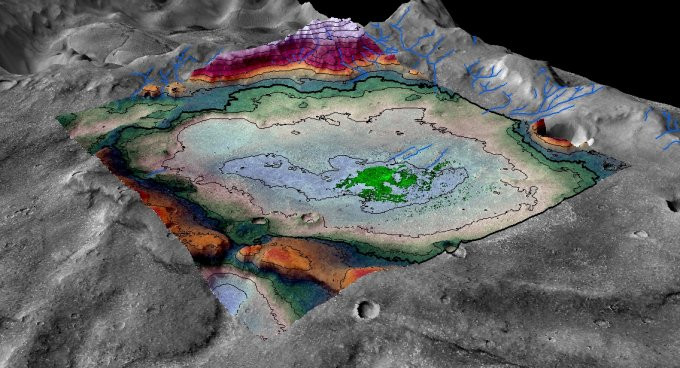Water on Mars: Last lake to exist on surface of red planet discovered

The last lake to exist on the surface of Mars has been discovered by scientists, who say it probably would have been habitable throughout much of its existence. This suggests the ancient lake could have hosted some of the last lifeforms to potentially exist on the Red Planet.
A team of researchers from the University of Colorado Boulder analysed an 18sq/m chloride salt flat in the Meridiani region of Mars - near the Mars Opportunity rover's landing site. Just like on Earth, large-scale salt deposits on Mars are thought to be evidence of evaporated bodies of water.
Mars became cold and dry billions of years ago. Research from earlier this year showed that 4.5 billion years ago it had an ocean covering 20% of the planet's surface , but it lost 87% of this water to space. As Mars lost its atmosphere over billions of years, the planet cooled and any remaining water condensed to form its north and south polar caps.
The University of Colorado Boulder scientists used digital terrain mapping and mineralogical analysis of the features surrounding the salt deposits to establish the ancient lake was no older than 3.6 billion years – a long time after Mars was thought to have been warm enough to have large amounts of surface water.
Publishing their findings in the journal Geology, the authors said that based on the extent and thickness of the salt, the water would have been around 8% as salty as Earth's oceans – this means they may have been hospitable to microbial life.
Brian Hynek, lead author of the study, said: "This was a long-lived lake, and we were able to put a very good time boundary on its maximum age. We can be pretty certain that this is one of the last instances of a sizeable lake on Mars. By salinity alone, it certainly seems as though this lake would have been habitable throughout much of its existence."
The scientists said the lake level appears to have eventually risen and breached the drainage divide, resulting in "significant outflow". Any remaining water evaporated, they added. "We conclude that this and other similar chloride deposits represent some of the last vestiges of habitable surface water on Mars as recorded in the mineralogical record."
© Copyright IBTimes 2025. All rights reserved.






















